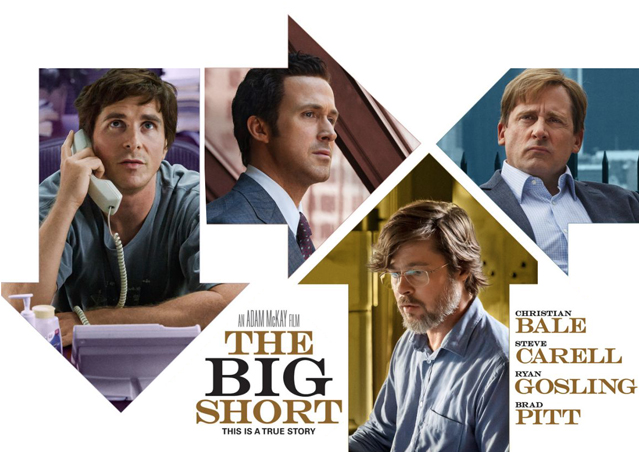|
The Big Short (2015) Directed by Adam McKay. Written by Adam McKay & Charles Randolph, based on the book by Michael Lewis. Featuring Christian Bale, Steve Carell, Ryan Gosling, Marisa Tomei, Brad Pitt, Hamish Linklater, Karen Gillan. Too Big to Fail (2011) Directed by Curtis Hanson. Written by Peter Gould, based on the book by Andrew Ross Sorkin. Featuring William Hurt, Billy Crudup, Paul Giamatti, Topher Grace, Cynthia Nixon, Bill Pullman, Tony Shaloub, James Woods. Margin Call (2011) Written and directed by J C Chandor. Featuring Kevin Spacey, Paul Bettany, Zachary Quinto, Jeremy Irons, Demi Moore, Stanley Tucci, Simon Baker. It's become clear that the housing market collapse of 2007-2008 was merely a symptom of the coming world collapse. A heart attack, if you will. However, right after the patient became relatively stable again, Fettucini Alfredo went right back on the menu. We know now that death is coming; it's only a matter of time. By 2010, the unregulated financial derivatives market stood at a value 20 times the world economy. Yes, you read that right; there is more money tied up in one casino-style bet in this financial casino than there is money in the world to pay it off. Mars needs ATMs. Since obviously no one has the political will to fix the situation, we can at least make crackling good films about it. It does the beg the question, though - if a bunch of movie stars can understand how untenable the scenario is, how is it that the people who are ostensibly paid for their knowledge of markets unable to make the connection? Adam McKay's new film The Big Short supplies part of the answer. It's a snarky affair, built and edited for YouTube consumption, with lots of fourth-wall breaking and guest appearances from Selena Gomez and Anthony Bourdain, among others. The story follows the adventures of several financial Wall Street outsiders who independently figure out that the housing market is a time bomb which must inevitably blow. It's a frequently, and ruefully, hilarious picture that will be familiar to anyone who has ever tried to introduce truth or data into a corporate meeting: No one believes you, because no one's read the thing you told them to fucking read. In every picture where something complicated is at stake, there is a scene where one character says, "Okay, explain this to me as if I were an idiot," and another character dutifully breaks it down. My favorite example of this is in the "no studying" scene in Ghostbusters: In the 2011 film Too Big to Fail, this is how they do it: And in the 2011 film Margin Call, this is how the scene plays out: The Big Short spends most of its running time doing variations of this scene, fully aware that it has a lot of complex jargon to get across and fully aware - perhaps too much so - that an audience will get bored if they don't have shiny distractions while this happens. And do we have shiny distractions? We do, in spades. And they, for the most park, work, as we float along from scene to scene as in a farce, which is probably the best way to tell this story. After all, if you can't laugh at the end of human civilization on the planet, when can you laugh?
Featuring a terrific cast of white men in sharp suits all trying to steal scenes from each other, The Big Short is as entertaining as it is informative about that Wall Street world. It isn't as skillful or dazzling as The Wolf of Wall Street, but it is probably more defensible and may even succeed better at educating its audience. In any case, the film laughs all the way to the bank it so distrusts. Previous entries into this genre, Too Big to Fail and Margin Call, treated the crisis soberly - even sternly - and if you saw all three films in a row you might have a decent handle on how the crisis played out. Too Big to Fail suffers from positioning men like Hank Paulson and Ben Bernanke as its moral center, an insane choice; on the other hand, the film does show some of the motivations of the insiders at the Fed and a corruption so deep it's been internalized like a religion. Margin Call views the crisis from the point of view of one of the corporations whose life is threatened by their own bad bets, and sees the entire crisis from that one position. I think Margin Call is the best of the films, but that is purely an aesthetic observation, as only The Big Short makes some effort to humanize the millions of ordinary people who are devastated by rich men playing board games with their lives. British Lord Chancellor Edward Thurlow said that the problem with corporations is that they have "no soul to be damned, and no body to kick." Wall Street has become the ultimate embodiment of that problem.
0 Comments
Your comment will be posted after it is approved.
Leave a Reply. |
AuthorThis is Joe Green's blog. Archives
August 2021
Categories |

 RSS Feed
RSS Feed
